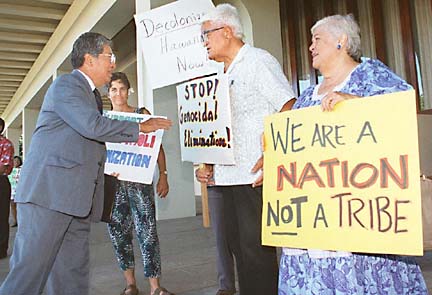
Members of the Hawaiian sovereignty group Kanaka Maoli greet Sen. Daniel Akaka at the University of Hawaii East-West Center.
Akaka bill serves as
a vehicle for justiceA recent decision by the Supreme
Court advances native rights
The long struggle of native Hawaiians to restore Hawaiian sovereignty has been strengthened by an unexpected source: the Supreme Court. A recent decision bolsters efforts to gain federal recognition and support for the Akaka bill.
Join the discussion
Charles Wilkinson is a legal scholar in the area of Indian law and indigenous rights. He will be part of a live call-in panel show about the Akaka bill at 7 p.m. tomorrow on KITV. Other panelists include retired Supreme Court Associate Justice Robert Klein and Hawaiian rights attorney Melody Kapilialoha MacKenzie. Edgy Lee will moderate.When: 7 p.m. Monday
Where: KITV-4
What: Live call-in show about the Akaka bill
Source: Jim McCoy, Ho'akea Communications
As is well known, the newly organized native Hawaiian government will not possess international sovereignty and therefore will not be fully independent. Nonetheless, the domestic sovereignty recognized by the Akaka bill is truly substantial. In modern times, mainland tribes have used their sovereignty to eliminate control by the Bureau of Indian Affairs and breathe new life into their communities. Hawaiians will do the same -- and more.
Opponents of Hawaiian sovereignty have long argued that Congress lacks constitutional authority to recognize a native Hawaiian government. In the judgment of most scholars in the field, including myself, Congress plainly has authority under the Indian Commerce Clause of the Constitution to recognize native Hawaiian sovereignty and otherwise legislate with respect to native Hawaiians. See, e.g., Felix S. Cohen's Handbook of Federal Indian Law, pp. 802-04 (1982 ed.). This is because the overthrow and subsequent actions affected only the recognition of Hawaiian sovereignty; the sovereignty itself continued to exist, albeit not recognized by the United States. Now a major Supreme Court ruling and the recent revisions to the Akaka bill have considerably strengthened the position of Hawaiian natives that Congress has constitutional authority to enact the Akaka bill.
In April the Supreme Court handed down its opinion in United States v. Lara, 124 S.Ct. 1628 (2004). The case involved the question of whether tribes have criminal jurisdiction over nonmember Indians.
Lara held that Congress has broad power over Indian affairs under the Constitution and that it can determine the nature of native governmental powers. The opinion explained that the Constitution authorizes Congress to "enact legislation that both restricts and, in turn, relaxes those restrictions on tribal sovereign authority." The court quoted an older case to the effect that "if [by the political branches] those Indians are recognized as a tribe, this court must do the same." In other language, the Lara opinion (referring to the restoration of the previously terminated Menominee Tribe of Wisconsin) stated that "indeed, Congress has restored previously extinguished tribal status -- by re-recognizing a Tribe whose tribal existence it previously had terminated." The opinion twice referred to the language that Congress used -- "recog-niz[ing]" and affirm[ing]" -- in restoring tribal jurisdiction over nonmember Indians.
This broad congressional power to "recognize and affirm" powers of native governments is most useful to Hawaiian natives in countering arguments that the Akaka bill cannot be passed because Hawaiian sovereignty was somehow "erased" by the overthrow or because Hawaiian natives are not within Congress's expansive authority under the Indian Commerce Clause. We should appreciate how closely the Menominee situation, cited with approval in the Lara opinion as just discussed, parallels the Hawaiian situation. The Menominee Tribe of Wisconsin was terminated -- legally very similar to the overthrow -- in 1954. Then, in 1973, Congress "restored" federal recognition by "recognizing" and "reaffirming" Menominee sovereignty. This is precisely what native Hawaiians seek in the Akaka bill.
Subtle redrafting of the Akaka bill has also been helpful in bringing the bill within the broad congressional power recognized by Lara. The terms "reaffirm" and "reaffirmation" -- similar to the phrase in the statute approved in Lara -- have been used in several places in the Akaka bill. The title of the Akaka bill has been amended to make it the "Native Hawaiian Government Reorganization Act of 2004." The word "Reorganization" brings the legislation into the main stream of native American legislation: The Indian Reorganization Act of 1934 authorized tribal constitutions for tribes who had not exercised their sovereignty in terms of constitution-making.
The unusually rich and detailed historical material in the statute and the legislative history also bolster the constitutional standing of Congress to enact this reform legislation. The extensive congressional findings in Section 2 of the bill and the revised Committee Report emphasize the kingdom's original sovereignty, the wrongs acknowledged in the Apology Resolution, and the many federal laws from the Hawaiian Homes Commission Act of 1920 to the numerous modern statutes that Congress has enacted through its trust relationship with the native Hawaiian community.
This long historical pattern shows the continuity -- the direct link -- between the kingdom recognized in the 19th-century treaties and the sovereign Hawaiian government that Congress will recognize in the Akaka bill. As the court in Lara put it, Congress decides "the metes and bounds of tribal autonomy," and the courts should not "second-guess the political branches' own determinations."
The attacks on native sovereignty and congressional authority will doubtless continue, but the Hawaiian position has without question been strengthened and reinforced during the last few months.
Legislation is never perfect, but the Akaka bill is a solid vehicle that brings long-delayed justice to Hawaiian people. Much hard work lies ahead to complete the complex procedures of the proposed legislation, but passage of the Akaka bill marks a historic accomplishment for native Hawaiians and deserves to be recognized as such.
To read more of Wilkinson's analysis of the revised version of the Akaka bill, visit the OHA Web site at www.oha.org.
Charles Wilkinson is a Moses Lasky Professor of Law at the University of Colorado School of Law in Boulder.
